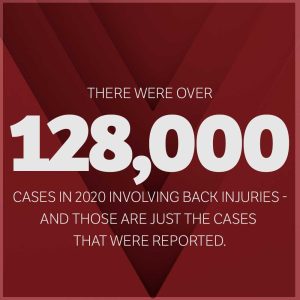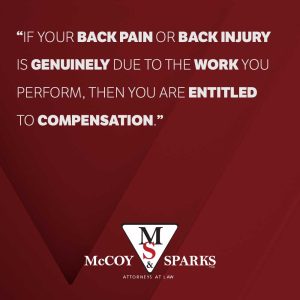
Back injuries are one of the most common injuries sustained in the workplace. According to the Bureau of Labor Statistics, there were over 128,000 cases in 2020 involving back injuries — and those are just the cases that were reported. Unfortunately, many cases go unreported for various reasons.
Some of the primary reasons employees don’t report their back injuries at work are because they don’t know that they may be entitled to workers’ compensation, don’t think their employer will approve workers’ comp for back pain, or fear of repercussions. This is why it’s so important to understand your rights as a worker.
If you are experiencing lower back pain due to the nature of your job, such as heavy lifting, you are entitled to file a workers’ compensation claim. Employers are not allowed to retaliate against their employees for filing these claims, and if your back pain or back injury is genuinely due to the work you perform, then you may be entitled to compensation.
However, though you may have a right to file a workers’ compensation claim, it is not uncommon for employers or their insurers to try to deny these claims — especially those involving back pain. This is because lower back pain often results from repetitive stress, as opposed to one obvious incident, which means it’s difficult in some cases to prove that the pain is work-related and not caused by something else.
At McCoy & Sparks, we understand how debilitating and frustrating lower back pain can be and are here to help. Our Kentucky workers’ compensation lawyers have years of experience handling these kinds of cases, and we know what it takes to prove that your lower back pain is work-related so you can get the workers’ compensation you deserve.
Common Causes of Back Injuries in the Workplace
While lifting heavy items is one of the most common causes of lower back pain, numerous other things could be contributing to your back pain at work. Many people experience back pain at work in a chair, for example, because sitting for long periods in one position can strain the back muscles.
Other common causes of lower back pain and back injuries at work include:
- Frequent bending, crouching, or stooping
- Frequent stretching, twisting, or reaching
- Standing for long periods
- Performing repetitive tasks daily that strain your back, such as packing products
- Operating heavy machinery
- Working at a computer for long periods, especially with poor posture
- Driving for long distances
Lower Back Injury From Lifting
Heavy lifting and lifting of bulky objects or pushing and pulling heavy objects are the most common causes of back pain and back injury in the workplace. If these are movements you perform frequently at work, they are the likely culprits of your back pain.
Some back pain might be the result of a temporary injury, such as a minor strain. For example, if you tweak a muscle while lifting something at work, you might experience mild pain for a few days or even weeks until the injury heals. Even a strain may require medical treatment such as physical therapy and prescription medications like muscle relaxers and anti-inflammatories.
However, in many cases, back pain ends up being long-term. This is especially true if your back never gets a rest from the movements that caused the pain to develop in the first place. This is often why so many workers suffer from back pain and never get relief because they just keep going about their jobs without taking breaks or doing anything to fix or prevent the pain.
Unfortunately, the longer your back pain goes untreated, the more likely it is to cause long-term complications that could eventually lead to a more serious injury or even a disability. This is why workers experiencing back pain must speak up and do something about it.
Not only should you file a workers’ compensation claim if you require treatment for your lower back injury and time off work, but you should also speak up so something can be done to prevent further injury and back pain in the future.
How to Prevent Lower Back Pain From Lifting
There are things you can do on your own to try to prevent back pain or a lower back injury, such as stretching and strengthening exercises. You can also be more mindful of your posture at work, and use proper lifting techniques when lifting heavy objects, such as squatting and lifting at the knees vs bending over and lifting with your back muscles. Taking frequent breaks to give your body a rest can also help.
However, if your job requires frequent lifting of heavy objects, such as work in a warehouse, construction, a factory, or anywhere else, your employer is required to provide proper training, equipment, and gear to keep you safe. They should also be allowing you to take breaks so you don’t overwork or strain yourself.
If you are experiencing back pain because your employer is not providing you with the right tools, equipment, or safety gear, then you can report the issue to HR or directly to the Occupational Safety and Health Administration (OSHA).
Recovering Compensation for Lower Back Pain From Lifting at Work

If you start experiencing lower back pain from lifting at work, you should report the issue as soon as possible. The sooner you report the problem, the easier it will be to trace back to the work you perform. Don’t just mention in passing that your back is bothering you, go to HR and tell them that you hurt your back while doing your job, and make sure they make an official written report of it.
If there was an official report made and you end up needing to file for workers’ compensation down the road, that initial report will help serve as evidence that your lower back injury may be likely work-related. It’s also important that you report the issue to your doctor as soon as possible so you can have medical evidence proving that you were injured and experiencing pain.
However, if you do wait to report the issue, you can still file a workers’ compensation claim, it just might be more challenging to prove. Your employer or their insurance could try to claim that you never reported the issue to them when your back pain began and they could then use that to try to deny your claim. They could also try to claim that you sustained the back injury somewhere else and are just trying to blame it on your job to get money.
Working with an experienced workers’ compensation lawyer can be incredibly helpful in these cases. Your lawyer will know how to help you obtain the evidence needed to prove that your lower back injury is work-related.
Additionally, it’s helpful to work with a lawyer because they can ensure you are awarded the right amount of compensation. Even if your claim is compensable, there is no guarantee that the insurance company will award you the full amount of workers’ comp benefits you deserve — but a lawyer can make sure that they do.
In general, workers’ compensation covers medical costs pertaining to your work injury and wages that are lost while you are out of work and recovering from your injury. A lawyer can ensure the compensation for these things is properly calculated.
Trust McCoy & Sparks—Premier Workers’ Compensation Back Injury Lawyer in Central Kentucky
At McCoy & Sparks, our workers’ comp lower back pain and back injury lawyers know what it takes to ensure our clients are paid the full and fair benefits they deserve. We can help you file your claim, ensure all information is correct on your paperwork, deal with denials or appeals, and make sure your benefits are fairly calculated so you are paid the full amount you are owed.
You owe us nothing unless we recover compensation for you. Make the right call to (844) 4KY-WINS for a risk-free consultation with one of our workers’ compensation attorneys today.

